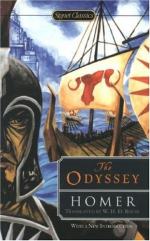Title: The Odyssey of Homer
Author: Homer, translated by Alexander Pope
Release Date: April, 2002 [EBook #3160] [This 11th edition first posted on June 1, 2003]
Edition: 11
Language: English
Character set encoding: ASCII
*** Start of the project gutenberg EBOOK the Odyssey of Homer ***
This etext was prepared by Jim Tinsley jtinsley@pobox.com with much help from the early members of Distributed Proofers.
INTRODUCTION
Scepticism is as much the result of knowledge, as knowledge is of scepticism. To be content with what we at present know, is, for the most part, to shut our ears against conviction; since, from the very gradual character of our education, we must continually forget, and emancipate ourselves from, knowledge previously acquired; we must set aside old notions and embrace fresh ones; and, as we learn, we must be daily unlearning something which it has cost us no small labour and anxiety to acquire.
And this difficulty attaches itself more closely to an age in which progress has gained a strong ascendency over prejudice, and in which persons and things are, day by day, finding their real level, in lieu of their conventional value. The same principles which have swept away traditional abuses, and which are making rapid havoc among the revenues of sinecurists, and stripping the thin, tawdry veil from attractive superstitions, are working as actively in literature as in society. The credulity of one writer, or the partiality of another, finds as powerful a touchstone and as wholesome a chastisement in the healthy scepticism of a temperate class of antagonists, as the dreams of conservatism, or the impostures of pluralist sinecures in the Church. History and tradition, whether of ancient or comparatively recent times, are subjected to very different handling from that which the indulgence or credulity of former ages could allow. Mere statements are jealously watched, and the motives of the writer form as important an ingredient in the analysis or his history, as the facts he records. Probability is a powerful and troublesome test; and it is by this troublesome standard that a large portion of historical evidence is sifted. Consistency is no less pertinacious and exacting in its demands. In brief, to write a history, we must know more than mere facts. Human nature, viewed under an introduction of extended experience, is the best help to the criticism of human history. Historical characters can only be estimated by the standard which human experience, whether actual or traditionary, has furnished. To form correct views of individuals we must regard them as forming parts of a great whole—we must measure them by their relation to the mass of beings by whom they are surrounded; and, in contemplating the incidents in their lives or condition which tradition has handed down to us, we must rather consider the general bearing of the whole narrative, than the respective probability of its details.




